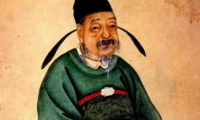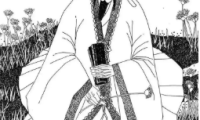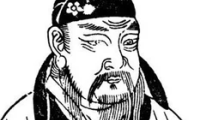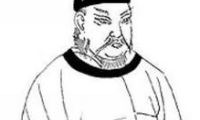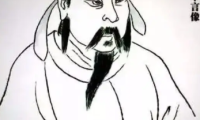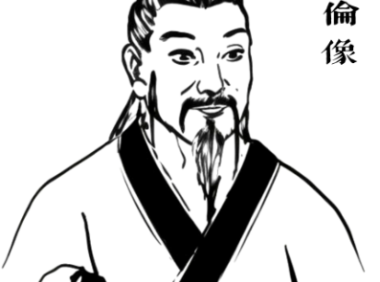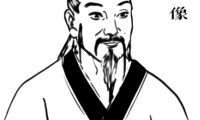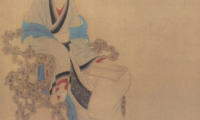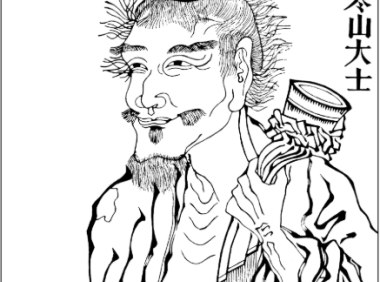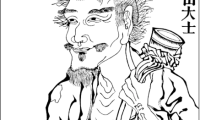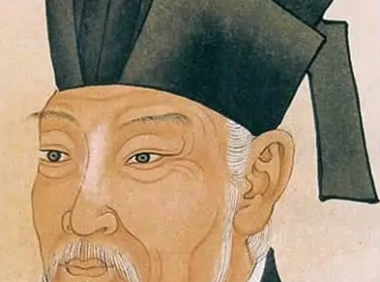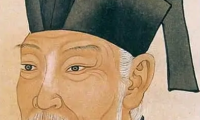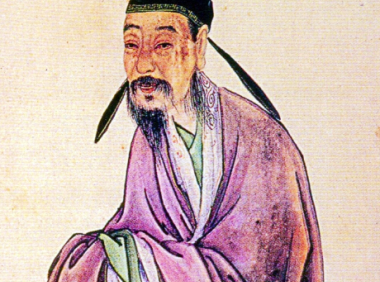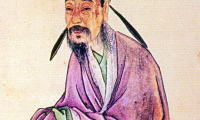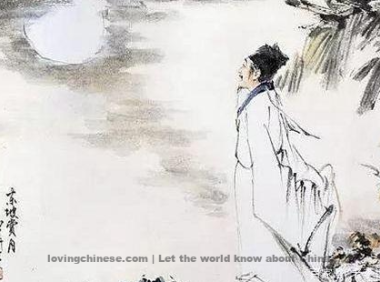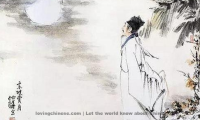-
Chia Tao: Overnight at a Mountain Temple
Jia Dao 宿山寺 贾岛 众岫耸寒色,精庐向此分。 流星透疏木,走月逆行云。 绝顶人来少,高松鹤不群。 一僧年八十,世事未曾闻。 Overnight at a Mountain Temple Chia Tao Flock of peaks hunched up and colored cold. The path forks here, toward the temple. A falling star flares behind bare trees, and the moon breasts the current of the clouds. Few men come to the very top… One tall pine won’t hold a flock of cranes. One monk here, at eighty, has never heard tell of the “world” down below. (J.P. Seaton 译)...
- 0
- 0
- 80
-
Tang Yanqian: Rugosa Rose
玫瑰 唐彦谦 麝炷腾清燎,鲛纱覆绿蒙。 宫妆临晓日,锦段落东风。 无力春烟里,多愁暮雨中。 不知何事意,深浅两般红。 Rugosa Rose Tang Yanqian Scenting of musk incense in combustion, And garnished with shark gauze1 to veil the green cluster as a decoration, She in the morrow Sol beams, pranks herself after the palatial style for adornment. Alas! With the waft of eastern breeze fall the silk-brocade ornament. Amidst the vernal mist she is flaccid without vitality and vigor. And vexatious with dole and grief in the rainy vesper. Beyond comprehension is her intention To be dressed in rubicundity of deep-delicate coloration. 1. “shark gauze” was a weft of the ancient shark fisherman. Nowadays, it generally refers to thin gauze. (黄龙 译)...
- 0
- 0
- 74
-
Wang Ya: “Song of Spring Journeying”
春游曲二首(录一) 王涯 万树江边杏,新开一夜风。 满园深浅色,照在绿波中。 “Song of Spring Journeying” Wang Ya Ten thousand almond trees by the riverbank Burst freely into bloom after one night’s wind. All over the park, colors dark and light Are reflected there in the green waves. (No. 1 from A Series of 2) (Irving Y. Lo 译)...
- 0
- 0
- 84
-
Li Hsün: “Sand of Silk-Washing Stream” (Huan-ch’i sha)
浣溪沙 李珣 其一 入夏偏宜澹薄妆,越罗衣褪郁金黄,翠钿檀注助容光。 相见无言还有恨,几回判却又思量,月窗香径梦悠飏。 “Sand of Silk-Washing Stream” (Huan-ch’i sha) Li Hsün 1 The daintiness of her attire is especially nice in summer. Her Yüeh silk gown is lightly yellow, the color of turmeric. Azure patches and crimson lips enhance her beautiful face. She says nothing of her bitterness when they are together. But every time they part, she thinks of him over and over. By a moonlit window, the path smells sweet, she dreams on. (Lois Fusek 译)...
- 0
- 0
- 58
-
Wei Zhuang: Tune: “Pu Sa Man” Dreaming in Autumn
菩萨蛮 韦庄 红楼别夜堪惆怅, 香灯半卷流苏帐。 残月出门时, 美人和泪辞。 琵琶金翠羽, 弦上黄莺语。 劝我早归家, 绿窗人似花。 Tune: “Pu Sa Man” Dreaming in Autumn Wei Zhuang How can one not be sad in a red chamber on parting night? The tasseled canopy was half closed in scented lamplight. The waning moon was still hanging when I left home. With tears in her eyes, she said good-bye. She played the pipa decorated with a golden-green feather. She plucked the strings in oriole language for me to decipher. She advised me to return home soon. For the person by the green window would be like a flower in bloom. (Edward C. Chang 译) Pu’ Sa Man (To the Tune-title ‘The Strange Goddesses’) Wei Zhuang North and South I Parting at night in the upper room what preys to grief we were – Lamp-lit fragrance and those half-rolled tasseled curtains there. The moon was waning as I left the house; Your beauty shone in every farewell tear. Your gilt guitar, king-fisher blue inlaid, Its strings a golden-oriole’s serenade, Urged me to come back soon, to come back soon To the green-gauze window veiling a flower-fresh maid. (Duncan Mackintosh, Ch’eng His and T’ung Ping-Cheng 译)...
- 0
- 0
- 72
-
Du Shenyan: Excursion in Early Spring ~《和晋陵陆丞早春游望》 杜审言 with English Translations
"Replying to Lu Cheng of Jinling on Early Spring Tour" is a work by Tang Dynasty poet Du Shenyan. This poem describes the poet's sadness of being unable to return home when he was on a business trip in a foreign land. The poem begins with a sigh, explaining that when one is away from home and on a business trip, one is "surprised" by the "phenology" of a foreign land. The middle two couplets specifically describe the "surprise", describing the scenery of the new spring in the south of the Yangtze River, and the poet's nostalgia for his hometown in the Central Plains. The last couplet points out the longing for home and expresses his original intention of being sad about the spring. This is a poem written in response to the poet's wishes, using personification to describe the early spring in the south of the Yangtze River, which is as vivid as a painting. The parallelism is neat, the structure is fine, and every word is polished. 《和晋陵陆丞早春游望》是唐代诗人杜审言的作品。此诗写诗人宦游他乡,春光满地不能归省的伤情。诗一开头就发出感慨,说明离乡宦游,对异土之“物候”才有“惊新”之意。中间二联具体写“惊新”,写江南新春景色,诗人怀念中原故土的情意。尾联点明思归和道出自己伤春的本意。这是一首和诗,采用拟人手法,写江南早春,历历如画。对仗工整,结构细密,字字锤炼。 《和晋陵陆丞早春游望》 杜审言 独有宦游人,偏惊物候新。云霞出海曙,梅柳渡江春。淑气催黄鸟,晴光转绿蘋。忽闻歌古调,归思欲沾巾。 Excursion in Early Spring Du Shenyan I'm far away from home;Things look new where I roam.Clouds bring dawn on the sea;Spring greens the willow tree.Orioles sing in…...
- 0
- 0
- 61
-
Zu Yong: Nostalgia on Southern Rivershore ~ 《江南旅情》 祖咏 with English Translations
This is a five-character poem by the Tang Dynasty poet Zu Yong. The scenery of the south of the Yangtze River in the work is an image of scenery. The poet mainly uses details to express his longing for his hometown and his concern for his neighbors. The beautiful scenery seen during the trip is certainly not bad, but the longing for his hometown in his heart is also expressed very earnestly. 唐朝诗人祖咏的五言诗。作品里江南景色是一种意象中的景色,诗人主要用细节刻画表现对家乡的思念,对乡邻的牵挂,旅行中见到的优美景色固然不俗,但心中对故乡的思念之情也表露得很殷切。 《江南旅情》 祖咏 楚山不可及,归路但萧条。海色晴看雨,江声夜听潮。剑留南斗近,书寄北风遥。为报空潭橘,无媒寄洛桥。 Nostalgia on Southern Rivershore Zu Yong Endless stretch Southern hill on hill;My homeward way is dreary still.Clouds on the sea foretell the rain;Tide brings at night the stream's refrain.My sword shines under Southern Star;North wind won't bring word from afar.Poolside tangerine's sweet in vain.Who will send them to Northern plain?...
- 0
- 0
- 74
-
Dai Shulun: The Temple of Qu Yuan ~ 《过三闾庙》 戴叔伦 with English Translations
"Passing by Sanlu Temple" is a five-character quatrain written by Dai Shulun, a poet in the Tang Dynasty. The poem expresses his compassion and sympathy for Qu Yuan. The whole poem recalls the past and revolves around the word "resentment". The language is clear, the poetry is implicit, and the poem is profound and meaningful, which has won praise from poetry critics of all generations. 《过三闾庙》是唐代诗人戴叔伦所写的一首五言绝句。该诗表达了对屈原的悲悯和同情。全诗抚今追昔,紧紧围绕“怨”字下笔,语言明朗,诗意含蓄,隽永深远,深得历代诗评家的赞誉。 《过三闾庙》 戴叔伦 沅湘流不尽,屈子怨何深!日暮秋风起,潇潇枫树林。 The Temple of Qu Yuan Dai Shulun Rivers Xiang and Yuan seem to weepOver the poet's sorrow deep.At dusk rises the autumn breeze;Leaves on leaves fall from maple trees....
- 0
- 0
- 63
-
Yu Hsuan-chi: Composed on the Theme “Willows by the Riverside” ~ 《赋得江边柳》 鱼玄机 with English Translations
"Fude Jiangbianliu" is a work by the Tang Dynasty poet Yu Xuanji. The first four lines of this poem depict a beautiful and misty picture of willows by the river: green stretches to the bank, willow smoke covers the distant building, shadows spread over the water, and flowers fall on people's heads; the last four lines turn from the above description to the description of unfortunate circumstances and sorrow, writing about the roots of the willow trees deeply hidden in the fish cellar under the water, the willow branches reluctantly tying up the guest boat, and the night of wind and rain, waking up from a dream and adding a bit of sorrow. The whole poem blends the scene and the mood, with twists and turns, and beautiful artistic conception. It is a superior work of describing the scene and expressing emotions. 《赋得江边柳》是唐代女诗人鱼玄机的作品。此诗前四句描绘了一幅美丽迷蒙的江边烟柳图:翠色连岸,柳烟远楼,影铺水面,花落人头;后四句由上面的写景,转入书写不幸的际遇和的愁情,写柳树的根深深的藏在水底鱼窖,柳枝依依不舍系住客舟,风雨潇潇的夜晚,从梦中惊醒又增添几许愁绪。全诗情景交融,曲折有致,意境优美,是写景抒情的上乘之作。 《赋得江边柳》 鱼玄机 翠色连荒岸,烟姿入远楼。影铺秋水面,花落钓人头。根老藏鱼窟,枝低系客舟。萧萧风雨夜,惊梦复添愁。 Composed on the Theme "Willows by the Riverside" Yu Hsuan-chi Kingfisher green lines the deserted shore,the misty vision stretches to a distant tower.Their shadows overspread the autumn-clear waterand catkins fall on the angler’s head.Old foots form hollows where fish hide;limbs reach down to moor the traveler’s boat.Soughing, soughing in the wind and rain of…...
- 0
- 0
- 58
-
寒山·《极目兮长望》 with English Translations
I tried my best to open my eyes and look into the distance, only to see white clouds all around me, which I couldn't see clearly. The falcon and crow are bloated and unable to fly high, while the phoenix and the phoenix suffer from hunger and wander aimlessly. The galloping horse was exiled to the barren Gobi Desert without water or grass, while the lame donkey was led to the high court committee and entrusted with important tasks. I want to ask the heavens why there are so many injustices in the world, but the heavens are high above and unable to ask, so they can only watch the wrens fly freely on the river and sea. 大意:我尽力的张开双眼眺望远方,只见四周白云弥漫看不清楚。鹞鹰和乌鸦都吃得饱饱的臃肿得无法高飞,鸾鸟和凤凰却忍饥挨饿彷徨不定。骏马被放逐在无水无草的戈壁滩,跛脚的毛驴却被牵到高堂委与重任。我想要问问苍天,人间为什么这么多不平事,但苍天高高在上无法追问,只好看着鹪鹩自由自在的飞翔在江海之上。 寒山·《极目兮长望》 极目兮长望,白云四茫茫。 鸱鸦饱腲腇,鸾凤饥彷徨。 骏马放石碛,蹇驴能至堂。 天高不可问,鹪鵊在沧浪。 A Traveler Brings Messages, Waiting While I Read From my heights I stare into an opaque sky; Thick clouds, though white, obscure the lower peaks. These rumors abound: the carrion crow eats fresh meat; The phoenix pecks for grubs from village to village; Horses fast as wind are exiled via pitted roads; They pass donkeys bearing empty vessels to court. The dense clouds say, "Do not ask Heaven why.” Yet we nesting birds are cast into…...
- 0
- 0
- 74
-
Li Xun: Tune: Buddhist Dancers ~ 李珣·《菩萨蛮·回塘风起》 with English Translations
This poem describes a woman's nameless longing. In the previous film, the environment where the woman is located is depicted, and the phrase 'flying partridges in pairs' is used to inspire the next film. The next film depicts a woman's love for "Where to Sail", with shallow language and deep emotions, and a clear voice. 这首词写一女子的无名相思。上片写女子所在的环境,用“双双飞鹧鸪”一句兴起下片。下片写女子对“征帆何处客”的爱恋,语浅情深,清音有余。 李珣·《菩萨蛮·回塘风起》 回塘风起波文细, 刺桐花里门斜闭。 残日照平芜, 双双飞鹧鸪。 征帆何处客, 相见还相隔。 不语欲魂销, 望中烟水遥。 Tune: Buddhist Dancers Li Xun The pool is wrinkled by the rising breeze; The door is closed against blooming plane trees. The plain drowned in setting sunlight, A pair of partridges swift in flight. Where is her roamer’s sail? She longs for him to no avail. Silent with broken heart in dream, Awake, she sees but misty stream....
- 0
- 0
- 59
-
白居易《寒闺怨》 – Bai Juyi English Translations – Chinese Poems
Bai Juyi 寒闺怨 寒月沉沉洞房静, 真珠[1]帘外梧桐影。 秋霜欲下手先知, 灯底裁缝剪刀冷。 唐代的府兵制规定:兵士自备衣装,衣服破损,要由家中寄来补充更换,特别是御寒的冬衣。诗中第一句的“洞房”指的是房屋后部女眷的居室。居所本已深邃,寒月一照,更见幽静;帘外梧桐投影,更见阴沉。室内的妻子正在灯下为远戍不归的征夫缝制寒衣,一摸剪刀,立刻感到秋凉;再想到远在边地受寒的丈夫,怎能不牵肠挂肚呢?全诗不言怨而怨自见,流露出作者对征夫怨妇的同情。 注释: [1]真珠:珍珠。 A Wife’s Grief in Autumn The cool moon shivers over her bower tranquil, Outside the pearly screen the shadow of a parasol old. Before autumn frost falls her fingers feel the chill, When she cuts clothes by lamplight with scissors cold....
- 0
- 0
- 25
-
白居易《春题湖上》 – Bai Juyi English Translations – Chinese Poems
Bai Juyi 春题湖上 湖上春来似画图, 乱峰[1]围绕水平铺。 松排山面千重翠, 月点波心一颗珠。 碧毯线头[2]抽早稻, 青罗裙带展新蒲。 未能抛得杭州去, 一半勾留[3]是此湖。 这首诗作于公元824年春天,作者杭州刺史任期将满之时。第一句是总评。第二句说西湖三面环山,峰峦错落,湖水平静地铺展在群山之间。第三句说山上松树成排,重峦叠翠。第四句说月亮映在湖心,好像一颗珍珠。第五句说早稻长满株行距,绿油油的一片,犹如绿色的地毯。第六句说新长出的嫩绿细长的蒲叶,就像罗裙的青带子一样迎风飘动。最后两句说诗人舍不得离开杭州,一半原因是为了西湖,可见作者对杭州西湖的情深意长。 注释: [1]乱峰:参差错乱的山峰。 [2]线头:此处指地毯上的绒毛。 [3]勾留:留恋,不舍。 The Lake in Spring What a charming picture when spring comes to the lake! Amid the rugged peaks water’s smooth without a break. Hills upon hills are green with thousands of pine trees, The moon looks like a pearl swimming in waves with ease. Like a green carpet early paddy fields undulate, New rushes spread out as silk girdle fascinate. From fair Hangzhou I cannot tear myself away, On half my heart this lake holds an alluring sway....
- 0
- 0
- 60
-
Wang Wei: His Life
Wang Wei Wang Wei: His Life Wang Wei was born during the golden years of the Tang Dynasty, in the current city of Puxian, province of Shanxi, in 701, into an aristocratic family. His father, grandfather and great grandfather were all government officials. His mother belonged to a prominent family as well. Wang had at least four younger brothers and one younger sister. Wang’s family background helped especially during the second part of his life, but in the beginning of his governmental career it was more of a hindrance to his advancement. Wang Wei came of age during the reign of emperor Xuanzong, who ruled from 712 to 756. Academically he was a child prodigy. By the age of fifteen Wang went to the capital Chang’an (modern day Xi’an) to study with the famous and well known teachers in order to pass the imperial examinations needed to be assigned a government position. He wrote his first poem in 718 at the age of seventeen. In 720 he sat for the regional examinations, and passed with the highest score. This qualified him to sit for the most difficult test, the jinshi, taken in the capital during the early part of each year by several thousand candidates. Only…...
- 0
- 0
- 117
-
Dreaming of My Deceased Wife on the Night of the 20th Day of the First Month
Su shi Dreaming of My Deceased Wife on the Night of the 20th Day of the First Month Su Shi 十年生死两茫茫不思量自难忘千里孤坟无处话凄凉纵使相逢应不识尘满面鬓如霜 夜来幽梦忽还乡小轩窗正梳妆相顾无言唯有泪千行料得年年肠断处明月夜短松冈 shí nián shēng sǐ liǎng máng mángbù sī liàng zì nán wàngqiān lǐ gū fén wú chù huà qī liángzòng shǐ xiāng féng yīng bù shíchén mǎn miàn bìn rú shuāng yè lái yōu mèng hū huán xiāngxiǎo xuān chuāng zhèng shū zhuāngxiāng gù wú yán wéi yǒu lèi qiān hángliào dé nián nián cháng duàn chùmíng yuè yè duǎn sōng gǎng Ten years living dead both boundlessNot think of capacity self hardly possible forgetThousand li alone grave not place say wife coldEven if together meet must not recogniseDust cover face, temples like frostNight come deep dream suddenly return homeLittle window properly dress make upMutual look not speak, just be tears thousand lineExpect proper every year heart break placeBright moon night thin pine guard Ten boundless years now separate the living and the dead,I have not often thought of her, but neither can I forget.Her lonely grave is a thousand li distant, I can't say where my wife lies cold.We could not recognise each other even if we met again,My face is all but covered with dust, my…...
- 0
- 0
- 106
-
Wang Wei: Love Seeds ~ 王维 《相思》 with English Translations
Wang Wei 小编导读:《相思》是唐代诗人王维的作品,是一首借咏物而寄相思的诗作。此诗写相思之情,却全篇不离红豆,正用其相思子之名以关合相思之情。首句写红豆产地;次句以“发几枝”一问,语极朴实,而又极富形象性,设问自然,则暗逗情怀;三句寄意友人“多采撷”,言在此而意在彼;末句点明其相思属性,且用一“最”字推达极致,则“多采撷”的理由自见,而自身所寄之意亦深含其中。全诗极为明快,却又委婉含蓄,语浅而情深,相传当时即为人谱曲传唱,流行江南。 Editor's introduction: "Lovesickness" is a work by Tang Dynasty poet Wang Wei. It is a poem expressing lovesickness by chanting objects. This poem describes lovesickness, but the whole poem is full of red beans, using the name of the acacia bean to relate to the lovesickness. The first sentence describes the origin of red beans; the second sentence asks "how many branches have grown", the language is very simple, but also very figurative, and the question is natural, which secretly provokes feelings; the third sentence implies that friends "pick more", the words are here, but the meaning is there; the last sentence points out the attribute of lovesickness, and uses the word "most" to push it to the extreme, so the reason for "pick more" is self-evident, and the meaning of the poem is also deeply contained in it. The whole poem is very bright, but also euphemistic and implicit, with shallow words but deep feelings. It is said that it was composed and sung by people at that time and became popular in Jiangnan. 《相思》 王维 红豆生南国,春来发几枝。劝君多采撷,此物最相思。 Love Seeds by Wang Wei The red bean grows in southern lands.With spring its slender tendrils twine.Gather for me…...
- 0
- 0
- 203
-
Wang Wei: In Spring the Fragrant Grass ~ with English Translations
Wang Wei 小编导读:诗歌表现辋川风光和自己生活其间的安闲自在,采用的是以少概多的描写笔法,一句一景,就象一幅幅图画一样,这些画面连接在一起,构成了含蕴丰富的“辋川闲居图”。 Editor's note: The poem expresses the scenery of Wangchuan and the leisurely and comfortable life of the poet himself there. It adopts a descriptive style of using the few to describe the many, with each sentence describing one scene, just like a series of pictures. These pictures are connected together to form the "Wangchuan Leisurely Life Picture" which is rich in connotation. 《凄凄芳草》 王维 萋萋芳草春绿,落落长松夏寒。牛羊自归村巷,童稚不识衣冠。 In Spring the Fragrant Grass In spring the fragrant grass is green and lushly spread,In summer pines shoot high and straight with chilly shade.The sheep and cows return to the lanes by no one led,And children at official raiment aren't afraid....
- 0
- 0
- 49
-
Wang Wei: Retiring to Mount Songshan ~ 《归嵩山作》 王维 with English Translations
Wang Wei 小编导读:《归嵩山作》是唐代诗人王维所写的一首五言律诗。此诗通过描写作者辞官归隐嵩山途中所见的景色,抒发了作者恬静淡泊的闲适心情。 Editor's Note: "Written on Returning to Mount Song" is a five-character regulated verse written by Wang Wei, a poet of the Tang Dynasty. This poem expresses the author's tranquil and leisurely mood by describing the scenery he saw on his way to Mount Song after resigning from his official position. 《归嵩山作》 王维 清川带长薄,车马去闲闲。流水如有意,暮禽相与还。荒城临古渡,落日满秋山。迢递嵩高下,归来且闭关。 Retiring to Mount Songshan The limpid stream is lined with green on green,Both horse and carriage move at a leisurely pace.The waters seem to flow at their own sweet will,The birds at dusk all flock to their resting place.An abandoned ferry, a ruined town: what a scene!The sunset glow sets autumn hills ablaze.Away at the foot of Songshan, quiet and still,I will retire behind closed doors—there’s my space!...
- 0
- 0
- 76
-
Wang Wei: Visit to the Stone-Gage Temple in the Sapphire Mountains ~《蓝田山石门精舍》 王维 with English Translations
Wang Wei 小编导读:这是一首纪游诗,描写游蓝田山石门精舍(佛寺)的经过。作于诗人晚年隐居蓝田山中的辋川别墅时。这首诗一起笔就透出诗人特别轻松、快适。 Editor's Note: This is a travel poem describing the experience of visiting Shimen Jingshe (Buddhist temple) in Lantian Mountain. It was written when the poet lived in seclusion in Wangchuan Villa in Lantian Mountain in his later years. From the beginning of this poem, the poet is particularly relaxed and comfortable. 《蓝田山石门精舍》 王维 落日山水好,漾舟信归风。玩奇不觉远,因以缘源穷。遥爱云木秀,初疑路不同。安知清流转,偶与前山通。舍舟理轻策,果然惬所适。老僧四五人,逍遥荫松柏。朝梵林未曙,夜禅山更寂。道心及牧童,世事问樵客。暝宿长林下,焚香卧瑶席。涧芳袭人衣,山月映石壁。再寻畏迷误,明发更登历。笑谢桃源人,花红复来觌。 Visit to the Stone-Gage Temple in the Sapphire Mountains With the sunset hills and streams aglow,I sailed as far as the wind would blow.Since curious minds made distance light,I'd trace upstream to the source on the height.Lush trees far yonder reached the clouds.The limpid curled through mountain crowdsTill O, who'd have thought, this ridge so fair!I left the boat and walked with a stick:Indeed it was nice where'er I'd pick!Some elderly monks were, under a pine,Enjoying the shade both cool and fine.Ere dawn the sutras were sung with a will,And the sitting at night made the mountains more still.E'en a cowherd boy seemed part of the holy joy,The woodman alone knew the outside world!The nights were passed in the forest vastWith incense burning and mats clean, unfurled.My clothes smelt sweet—from the gullyside flowers,And the stone-wall shone in the moonlight showers.In case I'd be…...
- 0
- 0
- 84
-
Bai Juyi: Sent As a Gift From Me, Your Husband
Bai Juyi Sent As a Gift From Me, Your Husband 赠内子 白 发 方 兴 叹青 娥 亦 伴 愁。寒 衣 补 灯 下小 女 戏 床 头。 暗 澹 屏 帷 故凄 凉 枕 席 秋。贫 中 有 等 级犹 胜 嫁 黔 娄。 Zeng Nei Zi Bai fa fang xing tanQing e yi ban chou.Han yi bu deng xiaXiao nu xi chuang tou. An dan bing wei guQi liang zhen xi qiu.Pin zhong you deng jiYou sheng jia qian lou. Sent As a Gift From Me, Your Husband Our white hair, begin to recite new poemsPretty ladies also accompanied with melancholy.Under my lantern, have to patch up the winter clothesSmall, young girls play around the head of your bed. Old and hidden are the layers of curtainsCold and dreary the autumn pillows and bed mats.Our rank and social status somewhere between poor and the middleOur success to be better off than Qian Lou....
- 0
- 0
- 14
-
Bai Juyi: Woman Under Arch-Topped Doors
Bai Juyi Woman Under Arch-Topped Doors 闺妇 斜 凭 绣 床 愁 不 动红 销 带 缓 绿 鬟 低。 辽 阳 春 尽 无 消 息夜 合 花 前 日 又 西。 Gui Fu Xie ping xiu chuang chou bu dongHong diao dai huan lu huan di. Liao yang chun jin wu xiao xiYe he hua qian ri you xi. Woman Under Arch-Topped Doors Slanted embroidery board abandoned next to her still and melancholy bedFading pink cheeks, green belt too loose, hair bun hanging down. He is so far away in Liaoyang, most of the spring without any news of himAgain at sunset, the evening blossoms are closed up....
- 0
- 0
- 7
-
Bai Juyi: Thinking of Female Eyebrows
Bai Juyi Thinking of Female Eyebrows 思妇眉 春 风 摇 荡 自 东 来折 尽 樱 桃 绽 尽 梅。 唯 余 思 妇 愁 眉 结无 限 春 风 吹 不 开。 Si Fu Mei Chun feng yao dang zi dong laiShe jin ying tao zhan jin mei. Wei yu si fu chou mei jieWu xian chun feng chui bu kai. Thinking of Female Eyebrows Naturally from the east, spring breezes swing and swayMost cherry and peach branches broken off, most plum tree branches torn. Remaining alone, she thinks of him to make her scrunched eyebrowsSpring breezes blow without end, blossoms have yet to open....
- 0
- 0
- 19
-
Bai Juyi: Given As a Gift to My Wife
Bai Juyi Given As a Gift to My Wife 赠内 生 为 同 室 亲死 为 同 穴 尘。他 人 尚 相 勉而 况 我 与 君。 黔 娄 固 穷 士妻 贤 忘 其 贫。冀 缺 一 农 夫妻 敬 俨 如 宾。 陶 潜 不 营 生翟 氏 自 爨 薪。梁 鸿 不 肯 仕孟 光 甘 布 裙。 君 虽 不 读 书此 事 耳 亦 闻。至 此 千 载 后传 是 何 如 人? 人 生 未 死 间不 能 忘 其 身。所 须 者 衣 食不 过 饱 与 温。 蔬 食 足 充 饥何 必 膏 梁 珍。缯 絮 足 御 寒何 必 锦 绣 文。 君 家 有 贻 训清 白 遗 子 孙。我 亦 贞 苦 士与 君 新 结 婚。庶 保 贫 与 素偕 老 同 欣 欣。 Zeng Nei Sheng wei tong shi qinSi wei tong xue chen.Ta ren shang xiang mianEr kuang wo yu jun. Qian lou gu qiong shiQi xian wang qi pin.Ji que yi nong fuQi jing yan ru bin. Tao qian bu ying shengZhai shi zi cuan xin.Liang hong bu ken shiMeng guang gan bu qun. Jun sui bu du shuCi shi er yi wen.Zhi ci…... -
Bai Juyi: Jingzhao Prefecture Fresh Growing Lotus
Bai Juyi Jingzhao Prefecture Fresh Growing Lotus 京北府新栽莲 污 沟 贮 浊 水水 上 叶 田 田。我 来 一 长 叹知 是 东 溪 莲。 下 有 清 泥 污馨 香 无 复 全。上 有 红 尘 扑颜 色 不 得 鲜。 物 性 犹 如 此人 事 亦 宜 然。托 根 非 其 所不 如 遭 弃 捐。 昔 在 溪 中 日花 叶 媚 清 涟。今 来 不 得 地樵 悴 府 门 前。 Jing Bei Fu Xin Zai Lian Wu gou zhu zhuo shuiShui shang ye tian tian.Wo lai yi chang tanZhi shi dong xi lian. Xia you qing nu wuXin siang wu fu quan.Shang you hong chen puYan se bu de xian. Wu xing you ru ciRen shi yi yi ran.Tuo gen fei qi suoBu ru zao qi juan. Xi zai xi zhong riHua ye mei qing lian.Jin lai bu de diQiao cui fu men qian. Jingzhao Prefecture Fresh Growing Lotus Stagnant and muddy waterLotus leaves above small cultivated fields.I arrive and produce one long chantKnow of some lotus on small eastern streams. Below have clear water and soft mudWithout their strong and pervasive fragrances.On top, their leaves hold the red dustColors and expressions not fresh…...
- 0
- 0
- 23
Checking in, please wait...
Click for today's check-in bonus!
You have earned {{mission.data.mission.credit}} points today
My Coupons
-
¥CouponsLimitation of use:Expired and UnavailableLimitation of use:
before
Limitation of use:Permanently validCoupon ID:×Available for the following products: Available for the following products categories: Unrestricted use:Available for all products and product types
No coupons available!
Unverify
Daily tasks completed














